北师大版高中英语必修四 Unit 12 Culture shock Lesson 4 The New Australians 教学设计
- 格式:docx
- 大小:28.37 KB
- 文档页数:4
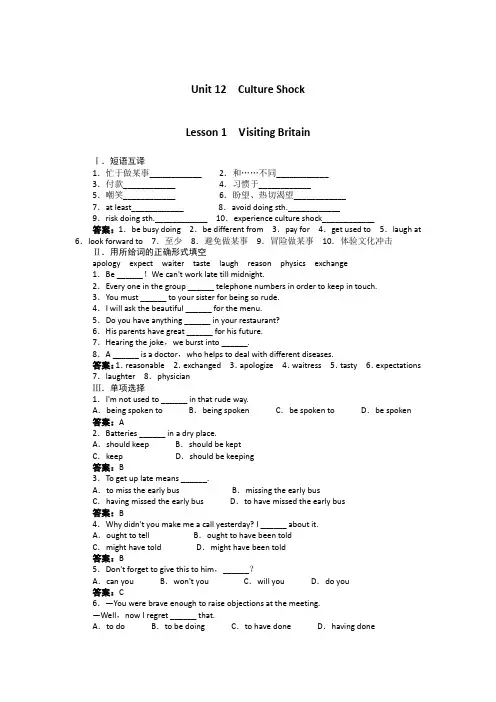
Unit 12Culture ShockLesson 1Visiting BritainⅠ.短语互译1.忙于做某事____________ 2.和……不同____________3.付款____________ 4.习惯于____________5.嘲笑____________ 6.盼望、热切渴望____________7.at least____________ 8.avoid doing sth.____________9.risk doing sth.____________ 10.experience culture shock____________答案:1.be busy doing2.be different from3.pay for4.get used to5.laugh at 6.look forward to7.至少8.避免做某事9.冒险做某事10.体验文化冲击Ⅱ.用所给词的正确形式填空apology expect waiter taste laugh reason physics exchange1.Be ______!We can't work late till midnight.2.Every one in the group ______ telephone numbers in order to keep in touch.3.You must ______ to your sister for being so rude.4.I will ask the beautiful ______ for the menu.5.Do you have anything ______ in your restaurant?6.His parents have great ______ for his future.7.Hearing the joke,we burst into ______.8.A ______ is a doctor,who helps to deal with different diseases.答案:1.reasonable2.exchanged3.apologize4.waitress5.tasty6.expectations 7.laughter8.physicianⅢ.单项选择1.I'm not used to ______ in that rude way.A.being spoken to B.being spoken C.be spoken to D.be spoken 答案:A2.Batteries ______ in a dry place.A.should keep B.should be keptC.keep D.should be keeping答案:B3.To get up late means ______.A.to miss the early bus B.missing the early busC.having missed the early bus D.to have missed the early bus答案:B4.Why didn't you make me a call yesterday? I ______ about it.A.ought to tell B.ought to have been toldC.might have told D.might have been told答案:B5.Don't forget to give this to him,______?A.can you B.won't you C.will you D.do you答案:C6.—You were brave enough to raise objections at the meeting.—Well,now I regret ______ that.A.to do B.to be doing C.to have done D.having done答案:D7.Sharon suggested ______ the classroom right away.A.we cleaning B.we to clean C.we clean D.us to clean答案:C8.Tom pretended ______ it but in fact,he knew it very well.A.not listen to B.not to hear aboutC.not to have heard about D.not to be listening to答案:C9.—I'm very ______ with my own cooking.It looks nice and smells delicious.—Mm,it does have a______ smell.A.pleasant;pleased B.pleased;pleased C.pleasant;pleasant D.pleased;pleasant答案:D10.Every ______ had been made in order to save the boy infected with the H5N1 bird flu virus,but in vain.A.effect B.affect C.infect D.effort答案:DⅣ.翻译句子1.我认为你应当给我们一个解释。
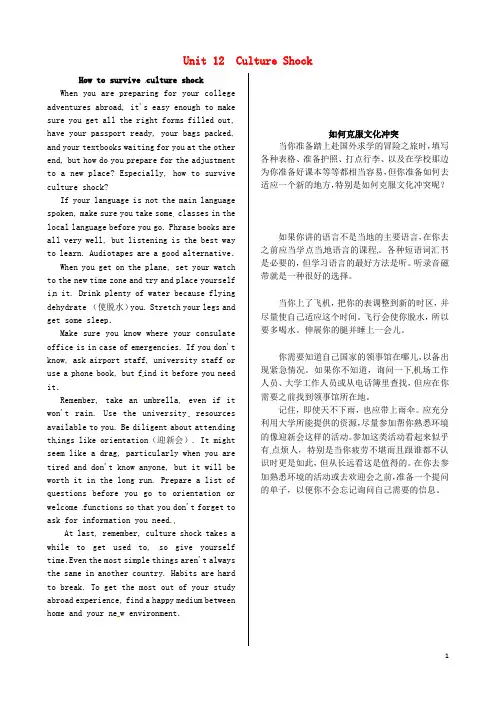
Unit 12 Culture Shock How to survive culture shockWhen you are preparing for your collegeadventures abroad, it's easy enough to makesure you get all the right forms filled out,have your passport ready, your bags packed, and your textbooks waiting for you at the other end, but how do you prepare for the adjustment to a new place? Especially, how to survive culture shock?If your language is not the main language spoken, make sure you take some classes in the local language before you go. Phrase books are all very well, but listening is the best way to learn. Audiotapes are a good alternative.When you get on the plane, set your watch to the new time zone and try and place yourself i n it. Drink plenty of water because flying dehydrate (使脱水)you. Stretch your legs and get some sleep.Make sure you know where your consulate office is in case of emergencies. If you don't know, ask airport staff, university staff or use a phone book, but f ind it before you need it.Remember, take an umbrella, even if it won't rain. Use the university resources available to you. Be diligent about atten ding th ings like orientation(迎新会). It might seem like a drag, particularly when you are tired and don't know anyone, but it will be worth it in the long run. Prepare a list of questions before you go to orientation or welcome functions so that you don't forget to ask for information you need.At last, remember, culture shock takes a while to get used to, so give yourself time.Even the most simple things aren't always the same in another country. Habits are hard to break. To get the most out of your study abroad experience, find a happy medium between home and your ne w environment.如何克服文化冲突当你准备踏上赴国外求学的冒险之旅时,填写各种表格、准备护照、打点行李、以及在学校那边为你准备好课本等等都相当容易,但你准备如何去适应一个新的地方,特别是如何克服文化冲突呢?如果你讲的语言不是当地的主要语言,在你去之前应当学点当地语言的课程。
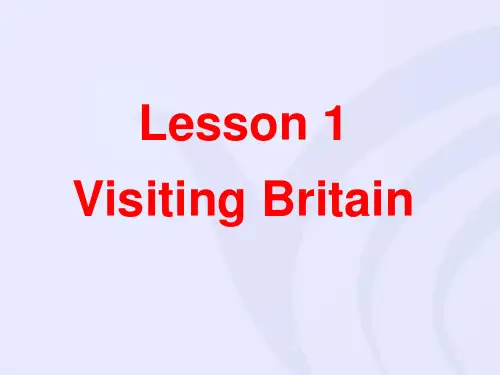

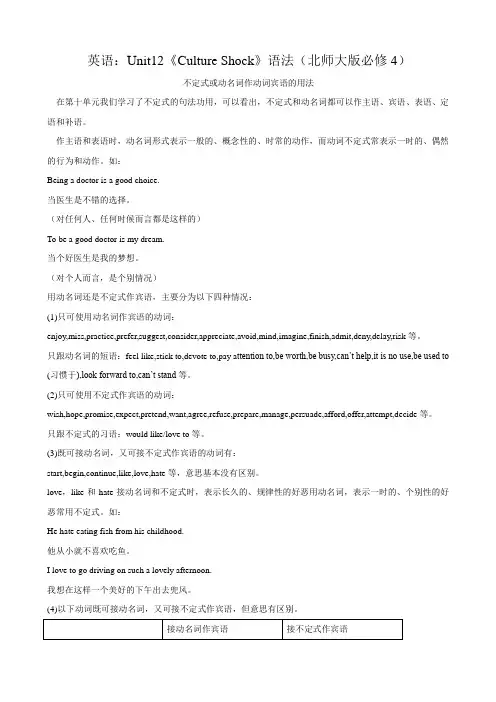
英语:Unit12《Culture Shock》语法(北师大版必修4)不定式或动名词作动词宾语的用法在第十单元我们学习了不定式的句法功用,可以看出,不定式和动名词都可以作主语、宾语、表语、定语和补语。
作主语和表语时,动名词形式表示一般的、概念性的、时常的动作,而动词不定式常表示一时的、偶然的行为和动作。
如:当医生是不错的选择。
(对任何人、任何时候而言都是这样的)当个好医生是我的梦想。
(对个人而言,是个别情况)用动名词还是不定式作宾语,主要分为以下四种情况:(1)只可使用动名词作宾语的动词:enjoy,miss,practice,prefer,suggest,consider,appreciate,avoid,mind,imagine,finish,admit,deny,delay,risk等。
只跟动名词的短语:feel like,stick to,devote to,pay a ttention to,be worth,be busy,can’t help,it is no use,be used to (习惯于),look forward to,can’t stand等。
(2)只可使用不定式作宾语的动词:wish,hope,promise,expect,pretend,want,agree,refuse,prepare,manage,persuade,afford,offer,attempt,decide等。
只跟不定式的习语:would like/love to等。
(3)既可接动名词,又可接不定式作宾语的动词有:start,begin,continue,like,love,hate等,意思基本没有区别。
love,like和hate接动名词和不定式时,表示长久的、规律性的好恶用动名词,表示一时的、个别性的好恶常用不定式。
如:他从小就不喜欢吃鱼。
我想在这样一个美好的下午出去兜风。
(4)以下动词既可接动名词,又可接不定式作宾语,但意思有区别。
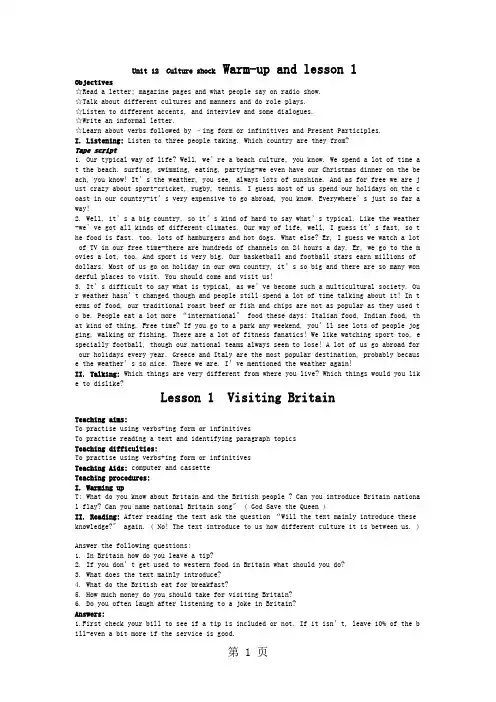
Unit 12 Culture shock Warm-up and lesson 1Objectives☆Read a letter; magazine pages and what people say on radio show.☆Talk about different cultures and manners and do role plays.☆Listen to different accents, and interview and some dialogues.☆Write an informal letter.☆Learn about verbs followed by –ing form or infinitives and Present Participles.I. Listening: Listen to three people taking. Which country are they from?Tape script1. Our typical way of life? Well, we’re a beach culture, you k now. We spend a lot of time a t the beach, surfing, swimming, eating, partying-we even have our Christmas dinner on the be ach, you know! It’s the weather, you see, always lots of sunshine. And as for free we are j ust crazy about sport-cricket, rugby, tennis. I guess most of us spend our holidays on the c oast in our country-it’s very expensive to go abroad, you know. Everywhere’s just so far a way!2. Well, it’s a big country, so it’s kind of hard to say what’s typical. Like the weather -we’ve got all kinds of different climates. Our way of life, well, I guess it’s fast, so t he food is fast, too, lots of hamburgers and hot dogs. What else? Er, I guess we watch a lot of TV in our free time-there are hundreds of channels on 24 hours a day. Er, we go to the m ovies a lot, too. And sport is very big. Our basketball and football stars earn millions of dollars. Most of us go on holiday in our own country, it’s so big and there are so many won derful places to visit. You should come and visit us!3. It’s difficult to say what is typical, as we’ve become such a multicultural society. Ou r weather hasn’t changed though and people still spend a lot of time talking about it! In t erms of food, our traditional roast beef or fish and chips are not as popular as they used t o be. People eat a lot more “international〞 food these days: Italian food, Indian food, th at kind of thing. Free time? If you go to a park any weekend, you’ll see lots of people jog ging, walking or fishing. There are a lot of fitness fanatics! We like watching sport too, e specially football, though our national teams always seem to lose! A lot of us go abroad for our holidays every year. Greece and Italy are the most popular destination, probably becaus e the weather’s so nice. There we are. I’ve mentioned the wea ther again!II. Talking: Which things are very different from where you live? Which things would you lik e to dislike?Lesson 1 Visiting BritainTeaching aims:To practise using verbs+ing form or infinitivesTo practise reading a text and identifying paragraph topicsTeaching difficulties:To practise using verbs+ing form or infinitivesTeaching Aids: computer and cassetteTeaching procedures:I. Warming upT: What do you know about Britain and the British people ? Can you introduce Britain nationa l flay? Can you name national Britain song〞 ( God Save the Queen)II. Reading: After reading the text ask the question “Will the text mainly introduce these knowledge?〞 again. ( No! The text introduce to us how different culture it is between us. ) Answer the following questions:1. In Britain how do you leave a tip?2. If you don’t get used to western food in Britain what should you do?3. What does the text mainly introduce?4. What do the British eat for breakfast?5. How much money do you should take for visiting Britain?6. Do you often laugh after listening to a joke in Britain?Answers:1.First check your bill to see if a tip is included or not. If it isn’t, leave 10% of the b ill-even a bit more if the service is good.2.Every town in Britain has at least one Chinese restaurant.3. humor, tip, food, money, accommodation4. Bacon and eggs with a few slices of toast5. Traveller’s cheques6.You don’t think anything funny.III. Language points1. at least 至少That building must be at least 200 years old. 那座建筑至少有二百年的历史.Birds use at least half of the air they take in to cool their bodies.鸟儿至少要使用它们吸入空气的一半来使自己降温.2. get used to + n /v-ing 习惯于……I’ve got used to the hot food here. 我已习惯了这里辣的食物。


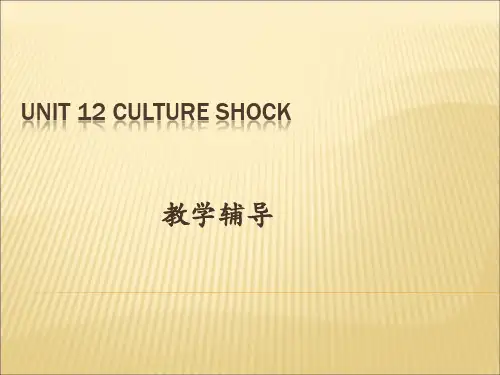
](https://uimg.taocdn.com/09eece3155270722182ef717.webp)
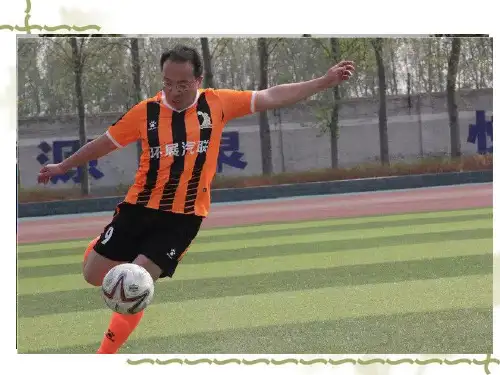
Unit 12 Culture ShockⅠ. 重点词汇1. owe/əʊ/ vt.欠(情、债等)owe sth. to sb. 把……归功于某人;欠某人……owe sb. sth. 欠某人……owing to 因为,由于2. apology/ə'pɒlədʒi/ n.致歉,认错apologize v.致歉,致歉owe sb. an apology 向某人致歉make an apology to sb. for sth.因为某事向某人致歉apologize to sb. for sth. 因为某事向某人致歉3. absorb/əb'sɔːb/ vt.理解,驾驭;汲取be absorbed in 用心于……4. brief/briːf/ adj.短暂的,简短的in brief 简言之5. exchange/Iks'tʃeIndʒ/ vt.兑换,交换exchange A for B 用A换Bexchange greetings 相互问候6. majority/mə'dʒɒrIti/ n.大半,大多数major adj.主要的;重要的;主修的;较多的n.主修科目;陆军少校vi.主修(in)minority n.少数,少数民族the majority of 大多数7. anyhow/'enIhaʊ/ adv.总之,反正;不管怎样8. reasonable/'riːz nəb l/ adj.合理的,正值的9. book/bʊk/ vt.预约,预料10. manners/'mænəz/ n.礼貌bad/good manners 没/有礼貌table manners 餐桌礼仪11. indicate/'IndIkeIt/ vt.表明;表示indication n.指示,说明;迹象,征兆12. curiously/'kjʊrIəsli/ adv.惊奇地;新奇地curious adj.新奇的curiosity n.新奇,新奇心be curious about 对……感到新奇13. familiar/fə'mIlIə/ adj.熟识的,常见的be familiar with 熟识……be familiar to 对……来说是熟识的be similar to 与……相像14. stare/steə/ vi.盯着看,注视stare at 注视,盯着看glare at 瞪着,怒视15. whisper/'wIspə/ vi.低语,耳语n.低语,耳语in a whisper/in whispers小声说whisper to sb. 小声和某人说话16. appetite/'æpItaIt/ n.食欲,胃口have a good appetite 胃口好17. belong/bI'lɒŋ/ vi.适应;属于belongings n.(运用复数)动产;财物belong to 属于18. attach/ə'tætʃ/ vt.喜爱,依恋;系,固定be attached to 仰慕,依恋依附于……19. contrary/'kɒntrəri/ adj.相反的on the contrary 正相反20. addition/ə'dIʃn/ n.相加,增加物additional adj.附加的,额外的additionally adv.此外add v.增加,添加;补充说,接着说in addition 此外,加之in addition to 除……之外Ⅱ.重点句型1. would rather do sth. “宁愿做某事”would rather后接从句,从句中用虚拟语气。
Lesson 4 The New Australians Teaching aims:To identify facts and opinions in a reading textTo practise using words with negative and positive connotationsTeaching difficulties:To practise using words with negative and positive connotationsTeaching Aids:computer and cassetteTeaching procedures:I. Warming upT: What do you know about Australia?Australia lies on the southern hemisphere. Australia is the sixth biggest country in the wo rld and the only country covering the whole continent. Australia is also one of the oldest continent. It has special animals. Can you name their names? But today we talk the topi c “The New Australia”. Can you guess what does the text talk about? Let’s read the text and see if your prediction is right.II. Reading1) Before reading the text can you write two questions about things you’d like to know a bout life in Australia? Then ask students to hand in their notes to the teacher.After reading the article teacher can ask these questions students write.2) Read the article again||,do the exercise 3 and make if the statements are true||,false or no information is given.When checking students’ answers||,have them read out the section of the text which giv es the answer and have them correct the false statements.3) Listen to the cassette and do the exercise 44) Do the first two with the whole class. Then students work in pairs||,reading the sent ences and discussing who said themIII. Further understandingNow||,go into the text for detail information. What can we do at night in Sydney ?• a wide choice of opera•classical concert•Shakespearean drama•Aboriginal culture•rock concert•Broadway musicals•comedy•cabaretWhy Australia is a marvelous mixture of many different culture?1) early Anglo-Irish cosmopolitan immigrants from Italy||,Greece||,Yugoslavia||,Turke y||,Vietnam||,and Cambodia. These lead to: influence in modern Australian cooking --f usion food --- A brilliant mixture of : delicious Mediterranean flavors||,Southeast Asian spices||,native Australian food2) during the time teachers can show some picture of famous people to make students int erested.Do the exercise 5Read the Strategies with the class and find the sentences that are quoted in the text. Students then look back at the sentences in Exercise 4and||,as a whole class discuss if e ach sentence is fact or opinion.Do the exercise 6Students work individually ||,referring to the text and matching the expressions with the definitionsIV. Vocabulary: (Lesson 4 )14. belong vi. 属于;为……之财产be a possession of; be the property ofChina belongs to the third world. 中国属于第三世界||。
Does this book belong to you? 这书是你的吗?Glory belongs to the Party. 光荣属于党||。
vi. 是(社团、家庭等)的成员to be part of; to be a member ofShe belongs to the tennis club. 她是网球俱乐部成员||。
These languages belong to the Latin family. 这些语言都是属于拉丁语族的||。
vi. 应归入;原位在;适合待在某处have its right place||,etc.She doesn’t belong here. 她不应该在这||。
belong in 在……中有适当的地位This lamp belongs in this room. 这灯应归这个屋||。
He thinks he belongs in teaching. 他认为自己适宜于从事教学工作||。
15. fond adj. 特别喜爱liking something or someone very muchI am fond of mushrooms. 我特别喜欢吃蘑菇||。
I am very fond of flowers. 我爱花||。
You’re very fond of reading. 你非常喜欢看书||。
He is fond of playing the piano. 他喜欢弹钢琴||。
adj. 亲爱的||,慈爱的loving; kindHe has a fond look. 他有副慈爱的面孔||。
She is very fond of her son. 她很宠爱她的儿子||。
a fond mother 慈祥的母亲adj. 溺爱的;痴妄的||,不切实际的foolishly loving; foolishly trusting or hopefulShe has fond hopes of becoming a movie star. 她妄想成为一名电影明星||。
a fond dream 黄梁美梦16. spot n. 点;斑点small||,round markA tiger has stripes and a leopard has spots. 老虎身上有条纹||,而豹有花斑||。
She has a white dress with blue spots. 她有一件白底蓝点的连衣裙||。
n. 污点;疵点dirty markThere were black spots all over it. 这上面到处是黑点||。
How did you get that spot on your face? 你脸上怎么弄脏了一块?n. 地点;场所placeI don’t know the exact spot where it happened. 我不知道事情发生的确切地点||。
The policeman ran to the spot immediately. 警察立即跑到了现场||。
vt. 弄脏;留下污点make a mark on somethingThe ink has spotted my clean shirt. 墨水把我的干净衬衫弄脏了||。
vt. 认出;出现see someone or somethingHe spotted his friend in the crowd. 他在人群中认出了他的朋友||。
on the spot 当场;立即then and there; at onceHe was killed on the spot. 他当场被杀||。
17. addition n.[U] 加法;增加putting things or numbers togetherHe is very clever at addition. 他擅长加法||。
There is no room for addition. 没有增加的余地||。
n.[C] 增加物;增加部分something added to another thingA new baby is an addition to the family. 新生儿给家庭增加一口人||。
in addition 另外;还alsoWhen Diane fell||,she hurt her arm and||,in addition||,broke her glasses.黛安妮摔倒时||,摔伤了胳臂||,还摔坏了眼镜||。